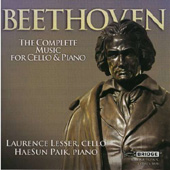
ESSENTIAL RECORDINGS

Beethoven did not compose his Cello Sonatas to expose the instrument's character or qualities, nor did he write them to test or
display a musician's prowess or artistry on the cello. He simply conceived them as works of music, in sonata form, to be played by this particular combination of musical
instruments. He himself had them published as Sonatas for Piano and Cello, and not as pieces for Cello with piano accompaniment. They are, in true
Beethoven fashion, musical arguments full of emotional drama and technical innovation, perfectly laid out and worked out from start to finish.
Cellist Laurence Lesser and pianist HaeSun Paik, who have lived with these works for a long time, perceive them as such and
deliver an impassioned and intelligent reading. An interpretation that definitely sets Beethoven as a 19th century composer, pushing the boundaries and establishing
new paths later to be travelled by Schumann and Brahms in their own chamber works. You can sense that this music has become second nature to these musicians, as
they feed off each other's devotion and project a clear image of what lies below the surface. This 2 disc set includes the three sets of Variations on themes by Handel
and Mozart, and the five Sonatas from Op. 5 to Op. 102. Also included, as an added bonus, is a DVD titled "Behind the Beethoven Project" featuring highlights
from a 2009 live performance by these two players of the same material that took place in Seoul, South Korea. This video also presents musical examples, demonstrations,
and conversations with the musicians that shed much light on the music itself, and on the beautiful instrument played by Laurence Lesser. It is a 400 year old Amati Cello,
that speaks with a deep baritone voice so resonant and rich as to resemble a double bass in the very low notes.
As for the sound recording itself, done in the New England Conservatory's acoustically perfect Jordan Hall, it is so good as to be almost tangible. Compared to some other
recordings of the same material, it fills your listening room and makes the sound's point of origin, the speakers, vanish, as very good recordings always do.
Jean-Yves Duperron - August 2010